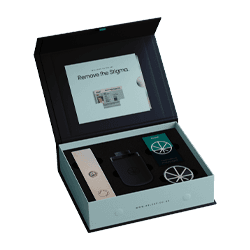Common symptoms of fibromyalgia include pain throughout the body, often described as an ‘aching’ or ‘shooting’ pain, muscle aches, fatigue, fibro ‘fog’ (slower mental processing, poor memory), and irritable bowel syndrome (IBS) symptoms.
Fibromyalgia can be extremely debilitating for some, with many having to take time off work or being put on long-term sick leave. There is no cure for fibromyalgia, and usually, it’s a combination of multiple therapies that will be initiated, usually by your GP or a specialist pain management team.
This could mean taking various medications to target the source of the pain, potentially medication to help you sleep, practising good sleep hygiene, and maintaining a balanced diet with frequent activity.
This, however, doesn’t always provide the relief that patients not only want, but need to live a healthy, balanced life. Increasingly, individuals battling this condition are looking at medical cannabis as another option to add to their current treatment plan, especially for those who have exhausted all other options.
This guide will cover fibromyalgia symptoms and look at how medical cannabis can potentially help reduce them.
Fibromyalgia and its symptoms
Fibromyalgia symptoms range from headaches to mood swings, sleep disruption and gastrointestinal problems, but pain and fatigue are two of the most commonly reported symptoms. Individuals may also suffer from memory loss, poor concentration, and a condition called ‘brain fog’.
Most individuals with fibromyalgia learn to live with mild to moderate symptoms and have strategies for maintaining a good work and home-life balance.
However, some days can be unbearable due to excessive pain, stiffness, and headaches that can happen at any moment. Flare-ups can strike without warning, and they can make daily life unbearable. Often there is no identifiable trigger or warning for this. Some may find it useful to keep an activity diary to see if any patterns emerge.
Current treatments and their limitations
Conventional pharmaceutical treatments can include the use of pain medications such as paracetamol, and ibuprofen, which you can buy over the counter. You may be prescribed medications that can help the neuropathic-type pains such as pregabalin or gabapentin which are both controlled drugs, and therefore come with greater side effects and increased risks.
If the individual suffers from depression and/or anxiety, they may be prescribed antidepressants and talking therapies such as CBT. Stress management techniques and sleep hygiene are helpful, as well as practising mindfulness, but they do not completely manage symptoms for many patients.
Many find that physical and occupational therapies are useful, as they can introduce new movements and exercises to reduce symptoms and even provide education on useful adaptions and equipment.
There is no one-size-fits-all treatment plan for fibromyalgia, and it will be very specific to you and your symptoms.
The potential benefits of using cannabis to manage fibromyalgia symptoms
The reasons why so many fibromyalgia patients are turning to medical cannabis include cannabis’s potential anti-pain, antianxiety and neuroprotective properties.
Cannabis-based products for medicinal administration in humans (CBPM) refer to a category of cannabis derivatives approved for consumption by authorised medical cannabis patients.
Recent research suggests promising evidence that medical cannabis products may help with managing physical pain and inflammation and the range of moods that accompany these physical symptoms. These products may also support more efficient cognitive functioning, as well as other psychological effects like lifting one’s mood or increasing motivation.
A recent study showed that medical cannabis had the potential to offer a beneficial effect on the quality of life for women with treatment-resistant fibromyalgia. The study examined medical cannabis’s influence on patients’ pain, sleep, psychological and physical domains.
Another study indicates that medical cannabis shows potential as a promising treatment option for those with fibromyalgia, especially for those who feel standard first-line medical options have failed.
Different strains and consumption methods of cannabis
Patches and topical creams may effectively reduce localised pain. Tinctures and tablets could also be good options for promoting relaxation and sleep.
Mechanisms of action
The cannabinoids (specifically THC) stimulate the receptors within our endocannabinoid system. The endocannabinoid system regulates many systems such as digestion, sleep, appetite, and mood.
The endocannabinoid system explained
The endocannabinoid system (ECS) involves receptors, signalling molecules (endocannabinoids), and enzymes located throughout the entirety of the human body. Endocannabinoids are cannabinoids produced in the body. The ECS is made up of CB1 and CB2 receptors, and it uses endocannabinoid chemical signals to essentially switch certain bodily functions on and off.
How THC and CBD interact with the endocannabinoid system
The cannabinoid compounds affect our endocannabinoid system. THC has been shown to mainly interact with the CB1 receptors found in the central nervous system, whereas CBD seems to mostly interact with the CB2 receptors found throughout the body and specifically in immune cells.
CBD may also reduce the enzymatic breakdown of our own endocannabinoids, which could allow them to interact with the ECS for longer periods. CBD has recently also been shown to act on the CB1, but in a much-reduced fashion when compared to THC.
How cannabis may help reduce fibromyalgia symptoms
Cannabis may help in reducing inflammation and discomfort relating to fibromyalgia. Strains that are high in specific terpenes which have potential anti-inflammatory properties could be effective choices for managing fibromyalgia symptoms. Pain may also be reduced, and many fibromyalgia patients have anecdotally reported that Indica-dominant strains are especially helpful for alleviating discomfort.
Some individuals find that the pain, and sometimes anxiety, caused by fibromyalgia interferes with restful sleep. Sleep deprivation will make the person feel worse alongside their symptoms. This study showed the possible benefits that medicinal cannabis may bring to patients looking to decrease symptoms of anxiety, while also increasing the length and quality of sleep.
Overall, when patients report that they have less fatigue and anxiety, they may see improvements in their lives. In addition, less inflammation means better mobility and flexibility, which allows many people to carry out daily tasks or manage a demanding work day. On a bad day, these symptoms may make leading a normal life feel impossible.
Potential risks and side effects associated with cannabis administration
Cannabis can interact with some pharmaceutical medications, so always consult your healthcare provider in regards to dosing and mode of delivery.
Medical cannabis can, at times and depending on the product, make a person lethargic, sleepy, uncoordinated, or unfocused, where others can become anxious or paranoid. The effects depend on the strain characteristics, a person’s health, body weight, height and other factors.
Legal considerations
Some legal considerations include driving and operating heavy machinery, carrying medical cannabis on your person and your occupation. Some people may have mandatory employment drug screening on a regular basis, so those individuals may want to consider the ramifications of employee drug screening.
The legal status of cannabis prescription for medicinal purposes
UK-qualified patients with qualifying health conditions can pursue a medical cannabis card through proper channels of application. Once prescribed by a specialist doctor, they are able to legally take medical cannabis. Otherwise, it’s illegal and is a class B drug.
If you would like to try medical cannabis to manage symptoms of fibromyalgia, you should consult your GP and ask for a specialist referral and also start the process of acquiring a medical cannabis card.
Conclusion
Medical cannabis is slowly but surely gaining more credibility as a potential option in reducing the symptoms of fibromyalgia due to its possible anti-inflammatory and pain-reducing properties. In some cases, it may offer relief when other standard and first-line medical options have failed. However, before pursuing this form of treatment, you need to consult with a doctor that is registered and qualified to prescribe medicinal cannabis.
At Releaf, we believe that access to medical cannabis is important. That's why we offer tailored monthly packages based on your cannabis prescription, specialist consultations for medical cannabis, and a unique medical cannabis card for protection.



